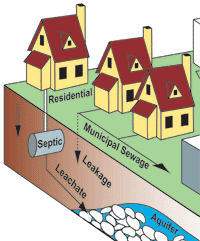
Photo from wikipedia
Abstract. Policy regarding effluent water and reclamation aims to prevent environmental pollution while proposing an alternative water resource. Water makes up 99–99.9 % of raw wastewater. Thus extracting organic and inorganic… Click to show full abstract
Abstract. Policy regarding effluent water and reclamation aims to prevent environmental pollution while proposing an alternative water resource. Water makes up 99–99.9 % of raw wastewater. Thus extracting organic and inorganic matter from water is a must. Worldwide, but especially in developed countries, great effort has been made to reuse wastewater, and it is becoming a reliable alternative source. Israel is the world leader in water reuse, allocating 85 % of effluent water for agricultural irrigation. As such, it constitutes a living laboratory in which to study the implications of the intensive use of treated wastewater for agricultural irrigation, leading to research and legislation regarding effluent quality and regulation. Effluent produced in Israel is subject to severe regulations and standards and is considered suitable for every use except drinking water. It is mostly allocated for agricultural irrigation with no restrictions. The irrigated lands are close to natural water sources, and therefore water leaching from the fields infiltrate those sources, becoming part of the water cycle. A group of persistent and toxic nano- and micro-organic contaminants, including pharmaceutical residues, flows to water-treatment plants from hospitals, industry, agriculture and especially the domestic sector. These contaminants' chemical structure, characterized by a couple of aromatic rings and double bonds, makes them especially persistent; they are resistant to conventional biological treatment, used as a secondary treatment. As a result, the effluent that leaves the treatment plants, which is considered to be of high quality, actually contains pharmaceutical residues. After secondary and tertiary treatment, these persistent chemical residues can still be found in surface water, groundwater and agricultural products. Pharmaceutical residues in effluent allocated for agricultural irrigation are undesirable. Expansion of the monitoring system for those contaminants, improvement of the tertiary treatment, and implementation of advanced technologies for decomposition and removal of pharmaceutical contaminants are thus needed
Journal Title: Hydrology and Earth System Sciences Discussions
Year Published: 2018
Link to full text (if available)
Share on Social Media: Sign Up to like & get
recommendations!